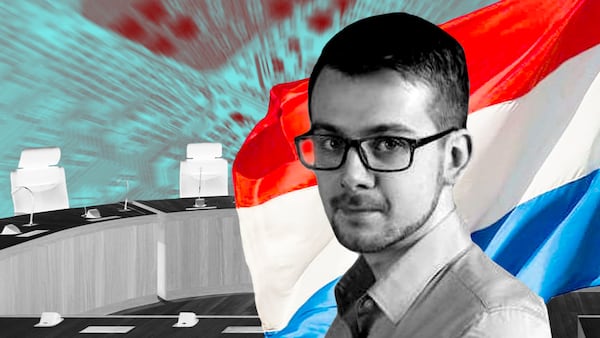- Industry groups filed briefs to support Roman Storm, the Tornado Cash developer facing trial in September.
- Alexey Pertsev was tried in the Netherlands in March.
- Cases could reshape the future of crypto privacy.
Even as Alexey Pertsev awaits a verdict following his recent trial in the Netherlands, the Tornado Cash scandal is spinning off another case that could reshape crypto.
In September, US prosecutors will try Roman Storm, another developer at the crypto mixer. And the industry is mobilising all the support it can muster to showcase how financial privacy and other key tenets are in the dock in both cases.
If both devs are found guilty, crypto advocates fear the subsequent “chilling effect” will stifle innovation and investment in the sector.
“The government would be free to target software developers aligned with politically disfavored causes and industries, who would have little in the way of defence or recourse,” the DeFi Education Fund wrote in a legal brief it filed with the court to support Storm.
Devs exposed
The Fund was one of three American blockchain associations that rallied to Storm’s defence last week. They write in so-called amicus briefs that if a jury finds Storm guilty, open source software developers around the world will be exposed to criminal liability for their contributions.
Storm, who is currently free on a $2 million bond, will be tried on money laundering, conspiracy to operate an unlicensed business, and violating sanction laws in a federal court in New York — unless a judge dismisses his case.
The action on both sides of the Atlantic mark an unprecedented effort by US and European authorities to control the freewheeling crypto ecosystem.
The cases also show how the breakthroughs of decentralisation are clashing with the legal restrictions of a pre-blockchain world.
‘Claiming that the defendant did not personally have control over the alleged stolen cryptocurrency is irrelevant.’
— Martine Boerlage, public prosecutor
In August 2022, the US Treasury Department sanctioned Tornado Cash, the decentralised, open source protocol that obfuscates crypto transaction histories, for allegedly enabling illicit actors, including North Korean cyber criminals Lazarus Group, to launder gains from crypto hacks and heists.
Shortly after, Pertsev was arrested in the Netherlands. And then Storm was charged and arrested in the US, as was a third developer named Roman Semenov, who is still at large.
Domino effect
Tornado Cash supporters argue that the protocol offers a legitimate solution to privacy concerns on the Ethereum blockchain, where transaction histories are public and immutable. They say the mixer protects a core right and value of the industry.
Governments don’t see it that way.
In two days of testimony in the Netherlands in March, Dutch prosecutors said Pertsev is guilty because he was involved in managing the protocol.
Even if he didn’t know precisely what was happening with every user, he is still responsible for making sure the project didn’t break the law.
“Claiming that the defendant did not personally have control over the alleged stolen cryptocurrency and therefore could not have laundered it are irrelevant,” public prosecutor Martine Boerlage said during the trial in the city of ‘s-Hertogenbosch on March 27.
What is relevant, according to Boerlage, is that Pertsev helped conceal criminal transactions with Tornado Cash and did not do enough to address illicit activity.
“The defendant did not monitor what was being deposited or withdrawn at all, conducted no checks whatsoever, kept no records, and explicitly communicated this to the customers,” she said.
Refraining from intervention or monitoring “can be highly relevant for criminal liability.”
In other words, doing nothing and claiming not to know anything is not a defence. Pertsev is still guilty of money laundering, Boerlage told the court.
But Keith Cheng, Pertsev’s lawyer, rejects that argument.
Automated smart contracts
He countered that Tornado Cash’s technology — built on immutable, automated smart contracts — prevents the protocol’s devs from knowing who is executing transactions on the platform, or to control who uses it.
Even if the website was taken down, savvy users would still be able to access the open source code.
“Not Pertsev or anyone else can control what is inside the smart contracts, only the person who moves the money has the controls,” Keith Cheng, Pertsev’s defence lawyer, told judges during the trial.
The Blockchain Association concurs.
“The main flaw in the government’s theory is that it fails to allege that Defendants had total independent control over any assets transferred using Tornado Cash,” the Blockchain Association wrote in their amicus brief.
Money transmitter licence
This line of argument will be a critical piece of the case. In the US, Storm is charged for conspiracy to operate an unlicensed money transmitting business.
This licence allows fintech outfits and non-banking financial institutions to legally carry out digital payments.
Without control over the assets, the developers cannot be held liable as money transmitters, the Blockchain Association argued in its brief.
Pertsev is only charged on one count for money laundering, and not for operating an unlicensed financial firm.
Even if he didn’t register as a reporting entity, he would still be in trouble, Dutch prosecutors said.
“It is not the case that if you are not a reporting institution (…) you are not criminally liable for money laundering, " they said during the trial.
They added that even reporting institutions and their management can be guilty of laundering money.
Looked away
In any event, Dutch financial crime investigators found evidence of group chats where the three Tornado Cash developers acknowledged hacks, and at times expressed concern but did not take direct action.
Pertsev “deliberately looked away,” prosecutors argued, “knowingly accepting the significant risk that Tornado Cash would be used for money laundering, which indeed happened on a large scale.”
If Pertsev is found guilty — the verdict is expected May 14 — this may have a ripple effect on the outcome of Storm’s trial, said Aaron Mackey, senior staff attorney at the Electronic Frontier Foundation.
Despite different legal structures and timelines, “one will potentially foreshadow what happens in another,” Mackey told DL News.
Inbar Preiss is a Brussels-based regulation correspondent. Contact her at inbar@dlnews.com.




